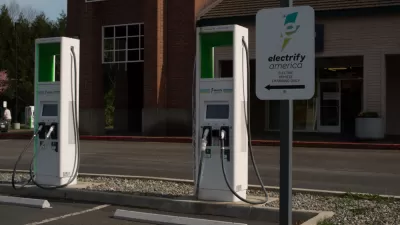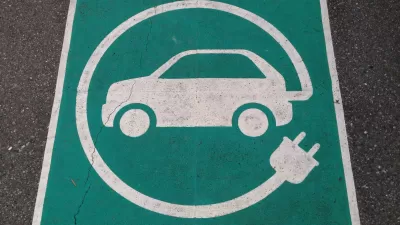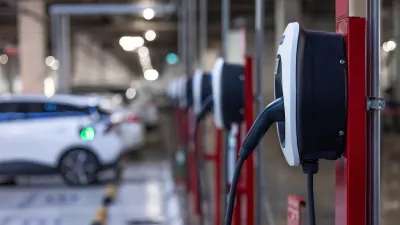More electric vehicles on the road will mean more demand for charging stations where drivers can power up away from home.

"With carmakers and state and federal government entities increasingly looking to combat carbon emissions with electric vehicles, one of the major sticking points to their widespread adoption remains the nation’s undersized and spotty charging infrastructure." As Planetizen previously covered, more private companies are stepping in to fill the gap and position themselves as key players in the growing electric infrastructure industry.
Jamie Lincoln Kitman reports on one such company, Charge, which "is offering a nationwide soup-to-nuts service that provides siting, planning, permitting and construction of E.V. charging stations."
"According to the Energy Department, there are roughly 50,000 (overnight or workday) Level 2 charger locations in service in the United States and Canada, and about 7,000 Level 3 fast charger locations, of which 1,400 are part of Tesla’s supercharging network," far short of the 500,000 proposed by President Biden and the millions needed to provide comprehensive coverage. Kitman writes that "Mr. Fox and Mr. LaNeve anticipate that eight million to 10 million chargers will be installed across the country over the next 15 or so years. They foresee a constantly changing parade of new technologies and a broad array of places where charging stations might be located, including hotels, supermarkets, health clubs and office buildings."
In the article, Charge chief executive Andrew Fox likens EV charging to cell phone coverage. "It’s like if you were trying to use a cellphone to go cross-country 30 years ago. You got expensive charges for roaming, you got dropped calls." Now, coverage is, for the most part, ubiquitous.
FULL STORY: When Electric Cars Rule the Road, They’ll Need Spots to Power Up

Planetizen Federal Action Tracker
A weekly monitor of how Trump’s orders and actions are impacting planners and planning in America.

Congressman Proposes Bill to Rename DC Metro “Trump Train”
The Make Autorail Great Again Act would withhold federal funding to the system until the Washington Metropolitan Area Transit Authority (WMATA), rebrands as the Washington Metropolitan Authority for Greater Access (WMAGA).

DARTSpace Platform Streamlines Dallas TOD Application Process
The Dallas transit agency hopes a shorter permitting timeline will boost transit-oriented development around rail stations.

Renters Now Outnumber Homeowners in Over 200 US Suburbs
High housing costs in city centers and the new-found flexibility offered by remote work are pushing more renters to suburban areas.

The Tiny, Adorable $7,000 Car Turning Japan Onto EVs
The single seat Mibot charges from a regular plug as quickly as an iPad, and is about half the price of an average EV.

Supreme Court Ruling in Pipeline Case Guts Federal Environmental Law
The decision limits the scope of a federal law that mandates extensive environmental impact reviews of energy, infrastructure, and transportation projects.
Urban Design for Planners 1: Software Tools
This six-course series explores essential urban design concepts using open source software and equips planners with the tools they need to participate fully in the urban design process.
Planning for Universal Design
Learn the tools for implementing Universal Design in planning regulations.
Municipality of Princeton
Roanoke Valley-Alleghany Regional Commission
City of Mt Shasta
City of Camden Redevelopment Agency
City of Astoria
Transportation Research & Education Center (TREC) at Portland State University
US High Speed Rail Association
City of Camden Redevelopment Agency
Municipality of Princeton (NJ)





























